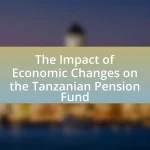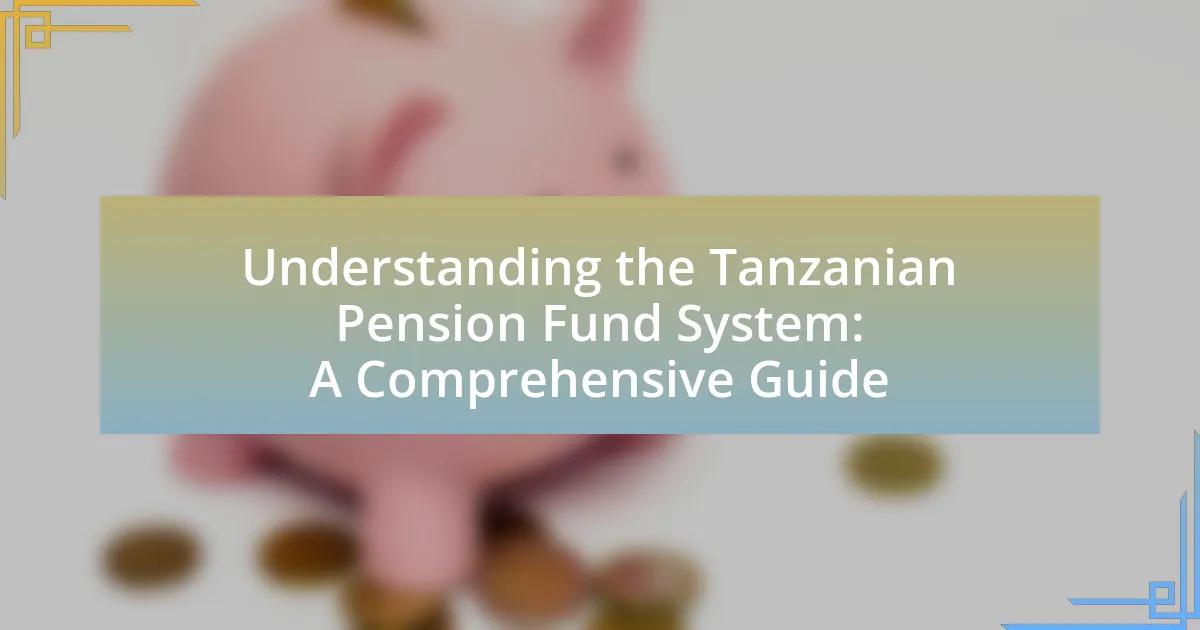Retirement planning is essential for Tanzanian workers, particularly due to the limited coverage of formal pension schemes, with only about 10% of the workforce participating. This article highlights the importance of proactive savings and investment strategies to ensure financial security in old age, addressing the risks of poverty and reliance on family support. It discusses the key components of effective retirement planning, available savings options, and the impact of government policies on retirement savings. Additionally, it examines the challenges faced by workers, including economic instability and cultural factors, while providing practical steps and resources for improving retirement planning efforts.

What is the Importance of Retirement Planning for Tanzanian Workers?
Retirement planning is crucial for Tanzanian workers as it ensures financial security and stability in their later years. With a significant portion of the population relying on informal employment and lacking access to formal pension schemes, many workers face the risk of poverty in retirement. According to the National Bureau of Statistics of Tanzania, only about 10% of the workforce is covered by any pension scheme, highlighting the urgent need for personal savings and investment strategies. Effective retirement planning allows workers to accumulate sufficient resources to maintain their standard of living, manage healthcare costs, and support dependents after they stop working.
Why is retirement planning crucial for workers in Tanzania?
Retirement planning is crucial for workers in Tanzania because it ensures financial security in old age, addressing the lack of a comprehensive social safety net. In Tanzania, the majority of the workforce is employed in the informal sector, where access to pension schemes is limited. According to the National Bureau of Statistics, only about 10% of the workforce is covered by formal pension plans, leaving many without adequate savings for retirement. This situation highlights the necessity for individuals to proactively save and invest for their future to maintain their standard of living after they stop working.
What are the potential consequences of inadequate retirement planning?
Inadequate retirement planning can lead to financial insecurity in old age. Without sufficient savings or investment strategies, individuals may struggle to cover basic living expenses, resulting in a reliance on government assistance or family support. According to a report by the World Bank, approximately 60% of Tanzanians lack access to formal retirement savings plans, which exacerbates the risk of poverty among the elderly population. Additionally, inadequate planning can lead to increased stress and health issues, as individuals face uncertainty about their financial future.
How does retirement planning impact financial security in old age?
Retirement planning significantly enhances financial security in old age by ensuring individuals accumulate sufficient savings and investments to support their living expenses after they stop working. Effective retirement planning involves setting clear financial goals, estimating future expenses, and choosing appropriate savings vehicles, which collectively help mitigate the risk of outliving one’s resources. According to a study by the National Bureau of Economic Research, individuals who engage in retirement planning are more likely to have higher savings rates and better financial literacy, leading to improved financial outcomes in retirement. This evidence underscores the critical role of proactive financial strategies in securing a stable and comfortable retirement for Tanzanian workers.
What are the key components of effective retirement planning?
The key components of effective retirement planning include setting clear financial goals, assessing current financial status, creating a diversified investment strategy, and regularly reviewing and adjusting the plan. Setting clear financial goals helps individuals define their desired retirement lifestyle and the income needed to support it. Assessing current financial status involves evaluating savings, debts, and income sources to understand the starting point for retirement savings. A diversified investment strategy mitigates risks and enhances potential returns, ensuring that savings grow over time. Regularly reviewing and adjusting the plan allows individuals to adapt to changes in financial circumstances, market conditions, and retirement goals, ensuring that the plan remains relevant and effective.
What savings options are available for Tanzanian workers?
Tanzanian workers have several savings options available, including the National Social Security Fund (NSSF), private pension schemes, and savings accounts offered by banks. The NSSF is a mandatory scheme that provides retirement benefits to employees in the formal sector, ensuring a basic level of financial security upon retirement. Private pension schemes, which can be established by employers or individuals, offer additional retirement savings tailored to specific needs. Furthermore, banks in Tanzania provide various savings accounts that allow workers to save money with interest, contributing to their financial stability and retirement planning. These options collectively support Tanzanian workers in preparing for their financial future.
How do pension schemes function in Tanzania?
Pension schemes in Tanzania operate primarily through mandatory contributions from both employers and employees, which are deposited into designated pension funds. The main regulatory body overseeing these schemes is the National Social Security Fund (NSSF), which manages contributions and ensures benefits are paid out upon retirement, disability, or death.
In Tanzania, employees contribute 10% of their salary, while employers contribute an additional 10%, creating a pool of funds that is invested to generate returns. This system is designed to provide financial security for workers in their retirement years. According to the NSSF, as of 2021, over 2 million members were enrolled in various pension schemes, highlighting the importance of these funds in providing social security to Tanzanian workers.
What role does government policy play in retirement planning?
Government policy significantly influences retirement planning by establishing regulations, tax incentives, and social security systems that shape individuals’ savings behaviors. In Tanzania, government policies such as the National Social Security Fund (NSSF) mandate contributions from both employers and employees, ensuring a basic level of retirement income. Additionally, tax benefits for retirement savings accounts encourage workers to save more for their future. These policies are crucial as they provide a framework that promotes financial security in retirement, evidenced by the fact that countries with robust retirement policies often report higher retirement savings rates among their populations.
What are the current retirement policies in Tanzania?
The current retirement policies in Tanzania are primarily governed by the National Social Security Fund (NSSF) and the Public Service Social Security Fund (PSSSF). These policies mandate that both employees and employers contribute a percentage of wages to the respective funds, ensuring financial support for workers upon retirement. As of 2023, the contribution rate is set at 10% from the employee and 10% from the employer for the NSSF, while the PSSSF has a similar structure. Additionally, the retirement age is generally set at 60 years, although certain professions may have different age limits. These policies aim to provide a safety net for workers, promoting financial security in old age.
How do these policies affect workers’ retirement savings?
Policies significantly impact workers’ retirement savings by influencing contribution rates, investment options, and overall financial security. For instance, mandatory retirement savings policies can increase the amount workers save over their careers, leading to larger retirement funds. According to the World Bank, countries with enforced savings schemes often see higher retirement savings rates, which can enhance the financial stability of retirees. Additionally, policies that provide tax incentives for retirement savings can encourage more workers to participate in retirement plans, further boosting their savings.
How can Tanzanian workers improve their retirement planning?
Tanzanian workers can improve their retirement planning by actively contributing to pension schemes and increasing their financial literacy. Engaging in formal pension plans, such as the National Social Security Fund (NSSF), ensures that workers accumulate savings for retirement. Additionally, enhancing financial literacy through workshops and educational resources enables workers to make informed decisions about investments and savings strategies. According to the World Bank, only 10% of Tanzanians are covered by formal pension schemes, highlighting the need for increased participation and awareness in retirement planning.
What strategies can individuals adopt for better savings?
Individuals can adopt several strategies for better savings, including creating a budget, automating savings, and setting specific savings goals. Creating a budget allows individuals to track income and expenses, helping them identify areas where they can cut costs and allocate more funds toward savings. Automating savings through direct deposits into savings accounts ensures that a portion of income is saved before it can be spent, which can significantly increase savings over time. Setting specific savings goals, such as saving for retirement or a major purchase, provides motivation and a clear target, making it easier to stay committed to saving. According to a study by the National Endowment for Financial Education, individuals who set specific financial goals are more likely to achieve them, reinforcing the effectiveness of these strategies.
How can financial literacy enhance retirement planning efforts?
Financial literacy enhances retirement planning efforts by equipping individuals with the knowledge and skills to make informed financial decisions. This understanding allows workers to effectively assess their retirement needs, choose appropriate savings vehicles, and manage investments wisely. For instance, a study by the National Endowment for Financial Education found that individuals with higher financial literacy are more likely to save for retirement and invest in diversified portfolios, which can lead to greater financial security in retirement. By improving financial literacy, Tanzanian workers can better navigate retirement planning, ultimately leading to improved financial outcomes.
What challenges do Tanzanian workers face in retirement planning?
Tanzanian workers face significant challenges in retirement planning, primarily due to inadequate financial literacy and limited access to formal retirement savings options. Many workers lack understanding of investment strategies and the importance of saving for retirement, which hinders their ability to plan effectively. Additionally, the formal pension system in Tanzania covers only a small percentage of the workforce, leaving a majority reliant on informal savings methods that are often insufficient. According to the World Bank, only about 10% of the labor force is enrolled in a pension scheme, highlighting the systemic barriers to effective retirement planning. Furthermore, economic instability and low wages further complicate the ability of workers to save consistently for retirement.
How does economic instability affect retirement savings?
Economic instability negatively impacts retirement savings by reducing individuals’ ability to contribute consistently to their retirement funds. During periods of economic downturn, job losses and wage stagnation often occur, leading to decreased disposable income and, consequently, lower savings rates. For instance, a study by the National Bureau of Economic Research found that during the 2008 financial crisis, retirement account contributions dropped significantly, with many individuals prioritizing immediate financial needs over long-term savings. This trend illustrates how economic instability can create a cycle of underfunded retirement plans, ultimately jeopardizing financial security in later years.
What cultural factors influence retirement planning in Tanzania?
Cultural factors significantly influence retirement planning in Tanzania, primarily through communal values and family structures. In Tanzanian society, the extended family system plays a crucial role, where individuals often rely on family support during retirement rather than personal savings or pensions. This reliance is rooted in cultural norms that emphasize collective responsibility and intergenerational support. Additionally, traditional beliefs about aging and respect for elders can affect how individuals perceive the need for personal retirement planning. For instance, many may prioritize immediate family obligations over long-term financial planning, leading to inadequate preparation for retirement. These cultural dynamics highlight the importance of integrating local customs and values into retirement planning strategies to enhance financial security for Tanzanian workers.
What are the best practices for retirement planning in Tanzania?
The best practices for retirement planning in Tanzania include starting early, contributing consistently to pension schemes, and diversifying investments. Early initiation of retirement savings allows individuals to benefit from compound interest over time, significantly increasing their retirement funds. Consistent contributions to pension schemes, such as the National Social Security Fund (NSSF) or private pension plans, ensure a steady accumulation of retirement savings. Diversifying investments across various asset classes, such as real estate, stocks, and bonds, mitigates risks and enhances potential returns. According to the World Bank, only about 10% of Tanzanians are covered by formal pension schemes, highlighting the importance of proactive retirement planning to secure financial stability in later years.
How can workers set realistic retirement goals?
Workers can set realistic retirement goals by assessing their current financial situation, estimating future expenses, and determining the desired retirement lifestyle. To achieve this, individuals should calculate their expected retirement income sources, such as pensions, savings, and social security, and compare them against projected living costs, including healthcare and housing. Research indicates that individuals should aim to replace 70-80% of their pre-retirement income to maintain their standard of living in retirement. Additionally, setting specific, measurable, achievable, relevant, and time-bound (SMART) goals can help workers create a structured plan for saving and investing, ensuring they are on track to meet their retirement objectives.
What resources are available for Tanzanian workers seeking retirement advice?
Tanzanian workers seeking retirement advice can access resources such as the National Social Security Fund (NSSF), which provides information on pension schemes and retirement planning. Additionally, the Ministry of Labour and Employment offers guidance on employment rights and retirement benefits. Non-governmental organizations, like the Financial Sector Deepening Trust (FSDT), also provide financial literacy programs that include retirement planning. These resources are crucial for helping workers understand their options and prepare for a secure retirement.
What practical steps can Tanzanian workers take today for a secure retirement?
Tanzanian workers can take several practical steps today for a secure retirement, including contributing to a pension scheme, saving regularly, and investing in diversified assets. By enrolling in the National Social Security Fund (NSSF) or private pension plans, workers ensure a steady income during retirement. Regular savings, even in small amounts, can accumulate over time, providing additional financial security. Furthermore, investing in assets such as real estate or stocks can yield higher returns, enhancing retirement funds. According to the World Bank, only 10% of Tanzanians are covered by formal pension schemes, highlighting the importance of proactive retirement planning to secure financial stability in later years.





